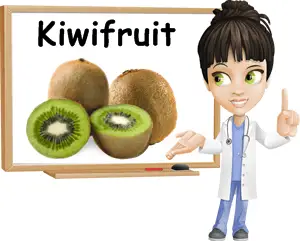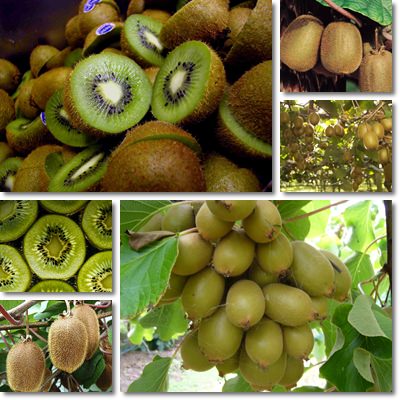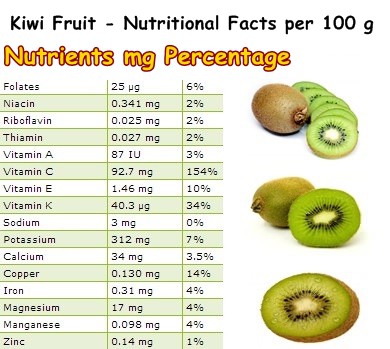The delicious kiwifruit is a tropical delight with great health benefits. On average, one kiwifruit has more vitamin C than two red oranges. Special compounds in the fruit can efficiently protect DNA from any mutations caused by free radicals and oxidative stress and even prevent blood clots. Because of its incredibly high antioxidant content, kiwifruit keep us looking young and fresh, not to mention it tastes exquisite.
Moreover, the fruit is a good source of both copper and potassium and contains moderate amounts of vitamins K and E. This means that regular consumption boasts anti-aging properties, contributes to maintaining steady blood pressure and helps prevent extrasystoles, arrhythmia and palpitations, supports blood coagulation and promotes skin health. Whether you prefer eating it by itself or adding it to a refreshing fruit salad, you should always find a place on our plate for kiwifruit.

What does kiwifruit look and taste like?
Kiwifruit are also known as Chinese gooseberries. These oval, sometimes fuzzy, brown-skinned fruit are about the size of a duck egg, though smaller varieties exist (the kiwi berry, for instance). They have a firm, yet soft, juicy sour flesh ranging from light green to yellow and even red. The fruit’s tiny, black, edible seeds are disposed circularly around an oval portion of white flesh.
The golden kiwifruit with its red-ringed variety is the second most popular kiwifruit species. For the most part, the fruits taste sour and acidic. If left to ripe excessively, they may lose their sour taste and become sweeter.
See also : Can You Eat Kiwi Seeds?
Kiwifruit nutrition facts and benefits
Kiwifruit owe their sweet-sour taste to a high vitamin C content: 50% more vitamin C per 100 g of fresh fruit than the RDI. Vitamin C is a water-soluble antioxidant, with amazing health benefits. For instance, a high intake of vitamin C can repair cell damage caused by free radicals and prevent cell mutations that eventually lead to cancerous formations. Also, eating foods rich in vitamin C, such as kiwifruit, helps reduce inflammation and thus lowers the risk of developing inflammation-related diseases.
Vitamin C is essential for collagen production, the main structural protein in our body that keeps us looking young and beautiful. Last but not least, the high amounts of vitamin C found in kiwifruit increase our immune system’s response to bacterial infections and viruses and are believed to lower the risks of developing colon cancer, heart disease, atherosclerosis and diabetes and reduce the severity of asthma, rheumatoid arthritis and osteoarthritis.

Very important: vitamin C supplements and a diet rich in vitamin C foods can help better manage respiratory problems. For instance, vitamin C can relieve symptoms associated with asthma, such as wheezing. Also, vitamin C can help keep allergy symptoms under control and prevent the severity of the condition.
Kiwifruit are a great source of fiber. Studies show that dietary fiber helps lower cholesterol by partially preventing its intestinal absorption. Also, eating foods rich in fiber, such as kiwifruit, walnuts, prunes or almonds helps relieve constipation naturally and significantly reduce colon cancer risks by reducing the time our colon is exposed to waste. By relieving constipation, they further provide benefits for hemorrhoids.
Moreover, fiber-rich foods can successfully keep blood sugar levels under control in patients with diabetes. Interesting fact: kiwifruit contain a special enzyme called actinidain which can digest proteins. Eating a kiwi after a protein-rich meal can help improve digestion as well.
Also read my article on kiwifruit and diabetes: can diabetics eat kiwifruit?

Kiwifruit are also great for our cardiovascular health. To be more exact, eating kiwifruit regularly significantly reduces the risk of developing blood clots due to its generous vitamin K content and helps lower triglyceride levels as a result of its dietary fiber content. Triglycerides are a type of blood fat which, in large amounts, can cause cardiovascular damage.
Kiwifruit are also a good source of potassium, a heart-friendly mineral. Potassium regulates heartbeat and blood pressure and neutralizes the harmful effects of sodium. In addition to this, kiwifruit promote healthy and beautiful skin due to their good vitamin E content.
Conclusion
Overall, kiwifruit boast wonderful health benefits and regular consumption is wholeheartedly recommended. Whether you like the fuzzy variety, the smooth one, golden or red-ringed kiwifruit or kiwi berries, the kiwifruit is a great choice for a healthy diet. Because of its lovely, firm, juicy flesh and sweet-sour taste, it can be successfully paired with almost any kind of fruit for an unbelievable taste experience. If you feel your kiwifruit are a bit too sour, put an apple or a banana near them and let them ripe into a succulent, mouth-watering tropical delight.
